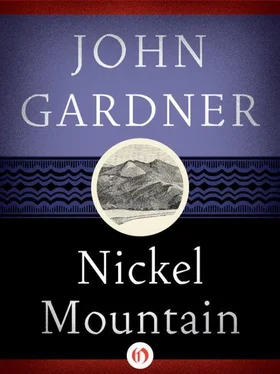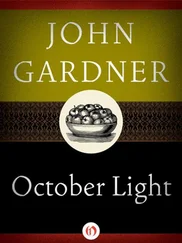Mary Lou wiped her eyes and blew her nose and said, “I really was proud that you chose me, Callie. I always loved you more than anything, and I didn’t think you knew I was alive. Do you remember the time the Griffith boys threw stones at me and you came and caught my hand and we ran home?”
Callie gave her hand a gentle squeeze. She didn’t remember.
Mary Lou said, “I was four-and-a-half and you were six.” Suddenly she was weeping rivers. “Oh, Callie, I do love you.”
“Dear Mary Lou,” Callie said softly, standing thousands of miles away, shaky at the revelation. How had she not realized? And how was it that her mother had known? How was it possible that one could be so incredibly, selfishly blind? And so that night, busy as they were, they had talked for hours, or rather Mary Lou had talked, Callie listening intently — in secret feeling trapped and bored — as if the two of them had just got engaged, or as if she was catching up on the life of a friend after years of separation.
A long, low truck carrying a big orange machine that looked vaguely military passed on the highway in front of the house. It was time now, but still no sign of Uncle John. She heard her mother shouting into Aunt Mae’s good ear, in the front parlor, and then she heard Cousin Rachel calling in the children from outdoors.
She smiled to keep from crying. It was supposed to be the groom that ran out at the last minute, not the bride. (She saw herself slipping quietly out the cellar door — she could reach the cellar from the pantry without anyone’s seeing her — and she saw herself lowering the cellar door again gently behind her, then going down swiftly toward the haylot and the woods beyond, carefully holding up the train and raising the skirts of the wedding dress.) Henry Soames would not run out, of course. He would be there in the church coat-room now, sweating in his tight collar, pulling nervously at his upper lip, wiping his forehead again and again, nodding and smiling whenever anyone spoke to him, no matter what it was they said. Aunt Anna was perhaps at the organ already, playing the favorite old hymns very softly, dragging her feet a little on the pedals, playing slowly, slowly, scowling at the page with her mouth bit shut as though she had pins in it. The ushers would be taking people in, the friends of the groom on one side, the friends of the bride on the other. Robert Wilkes would be fitting himself to a choir robe. The Griffith boys and John Jones and Ben Williams — maybe even Cousin Bill and Cousin Dune — would be behind the church tying tin cans and shoes onto Henry’s car, and putting signs on it, or worse. Again Callie smiled. Henry loved that car, beat up and old-fashioned as it was. He loved it as much as Uncle Grant loved his cream-colored hardtop. When they came out of the church and all the people were throwing rice and confetti and she was getting ready to throw her bouquet, there would be the car, poor Henry’s pride, at the foot of the walk, pushed around from where he’d parked it so that it would be the first thing he saw when he came out. It would be fixed shamefully, all its square antique dignity mocked by streamers and vulgar signs (they wrote on one car, “Hot Springs by sunset”), and Henry would gape, having known all along it was going to happen, for all George’s caution, but still not prepared, deeply shocked, feeling as though a whole part of his life had been torn from him and trampled. He’d stand frozen, staring in disbelief and sorrow. And then what? she thought. And then he will smile.
The bakery truck was still outside, and around the corner, out of sight, the man was saying, “Lady, I don’t care who signs it, I don’t care if a two-days-old baby signs it, but when I check in all the slips are supposed to be signed.” Aunt Joan’s voice said, “Don’t you sign it, Priscilla. Never sign for merchandise till you’ve checked it.” The man said, “So check it. I’m stopping you?” Aunt Joan said, “There might be nothing inside, only rocks. He might be a thief that came here to steal the jewels.”
When Uncle John’s green Buick appeared (all at once, as if out of thin air, nosing tortuously into the driveway), she felt dizzy. The same instant there came a soft knock on the door and a child’s voice — Linda’s — calling her name. “Callie,” she said, “your mom says to tell you it’s time.”
When she opened the door, her mother and the bridesmaids and all the aunts who hadn’t left for the church were standing with their faces turned toward her, beaming. Prince got up slowly, with an old-dog sigh, and came over to stand at her feet. Uncle John was standing at the front door, watching too. When he saw her he took off his hat. No one moved or spoke for an instant (except the children, as indifferent to what was happening as Callie was unaware of their indifference) and Callie was overwhelmed by her sense of their mutual helplessness: They had done everything they could, had swarmed to her side as they might in a time of tragedy, some of them hardly knowing her, from Cobleskill and Rochester and Cleveland, Ohio, and even, one of them, California, bearing gifts that would make her house beautiful and give it its solid anchor in tradition, and they would join her celebration of the ancient forms — the ride to the church with her mother’s oldest brother, the lighting of the symbolic candles, the pure white runner now walked on, stained, her father’s words, signifying to all the world (she understood now for the first time, in alarm) that she had lost forever what she’d never realized she had. There would come the magical exchange of rings, the lifting of the veil, the kiss, and then Aunt Anna would play that organ maniacally, tromping the pedals, not caring how many of the notes she missed, for Callie (poor Callie whom we all knew well) had died before her time and had been lifted to Glory — and the rice would rain down (Uncle Gordon ducking, trying to snap pictures, shielding the expensive camera he’d bought for taking pictures of the flowers in his garden and the prize turkeys he raised for the Fair) — rice and confetti raining down like seeds out of heaven, numberless as stars or the sands of the seashore, shining like the coins that dropped from Duncan’s pockets — and then the symbolic biting of the cake, the emptying of the fragile glass (Uncle Gordon taking more pictures, frenetic, even George Loomis the eternal bachelor smiling, joyful, quoting scraps of what he said was Latin verse): They would join her in all this, yet could no more help her, support her, defend her than if they were standing on the stern of a ship drawing steadily away from her, and she (in the fine old beaded and embroidered white gown, the veil falling softly from the circlet on her forehead), she, Callie, on a small boat solemn as a catafalque of silver, failing away toward night.
I will love him, she thought. I don’t know whether I love him or not, but I will.
It was suspicious, now that she thought of it, that they’d left her there alone for half-an-hour, knowing where she was, surely having things to say to her but not saying them, waiting, gathered at the door: Not even one of the children had violated the room. Not even Prince. But now they were all of them talking at once, saying, “Callie, you’re beautiful, beautiful, an’t-it?” Saying, “Hurry, hurry! Just fifteen minutes,” and “Children, out to the cars! Quick about it!” And now Uncle John was beside her, giving her his arm.
Neither of them spoke on the way to the church. She sat very still, hands folded in her lap, looking out at brilliant yellow wheat stubble on hills pitched or slanting away into tree-filled glens where spring water ran and brightly dappled guernsey cows could go to drink or lie down in the heavy shade. They came to the maples and beeches of the slope, the nearer mountains bright with twenty shades of green (in a month it would all be gold and red), the higher mountains in the distance clean blue. They passed the little store — Llewellyn’s American Eagle Market — with its sharply pitched roof and long wooden porch where in her grade school days she’d played jacks or sat with her lunchpail eating sandwiches and black bean salad, sometimes going in to buy an Orange Crush with a dime she’d earned picking up sticks from the yard or with a handful of pennies that had spilled out of one of the thrashing men’s overalls. They passed the cottage-like house where David Parks lived once, the house crudely snow-fenced, set back from the road, shaded by pine trees and jutting out from the mountain’s bank like a granite boulder, and she remembered sitting in the swing in her yellow dress the day of his birthday party, shyly watching his older sister Mary holding hands with her boyfriend from Slater. Uncle John slowed down, pointing up into the woods with his bent first finger, and she saw a deer. She smiled. It was a lucky omen. And then the church steeple came in sight, and then the whole church, white and old-fashioned, the paint peeling, the shingled roof newly patched with yellow-red cedar, and all around the church and all along the highway more cars than she could remember having seen in one place in all her life. (They’d be hustling Henry away from the window, because he mustn’t see her until the moment all of them saw her at the end of the aisle. George Loomis would be there beside him, looking him over, telling him he looked like Good King Jesus (for the Preacher’s benefit), and keeping one eye on where the car was hidden, actually believing he’d be able to protect it.) Everywhere she looked there were birds — orioles, robins, blue jays, waxwings, nuthatches, sparrows — bright as the red and yellow roses climbing the bank at the foot of the church lawn. The sky was bright blue, the bluest sky in the world, with just one white cloud, so precisely outlined it looked like a picture in a child’s book of fairy tales.
Читать дальше











